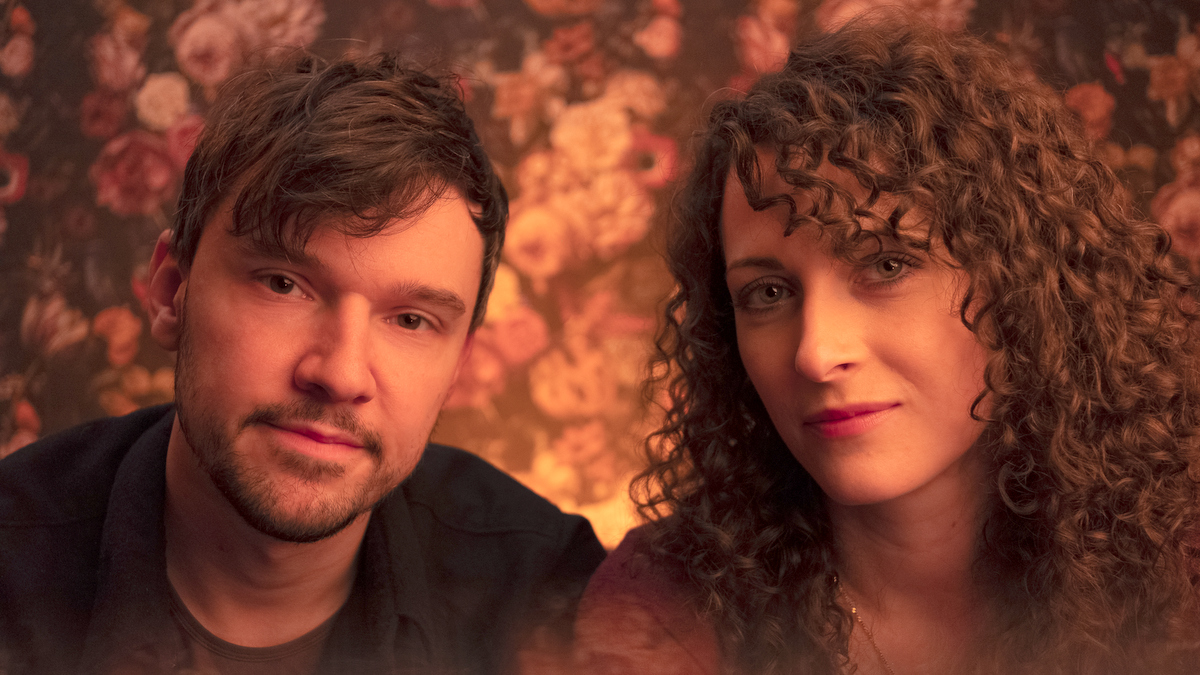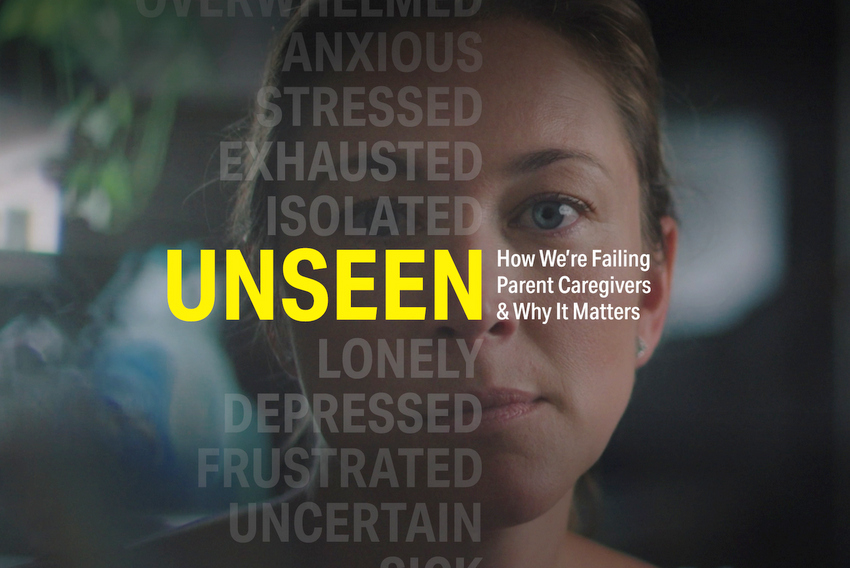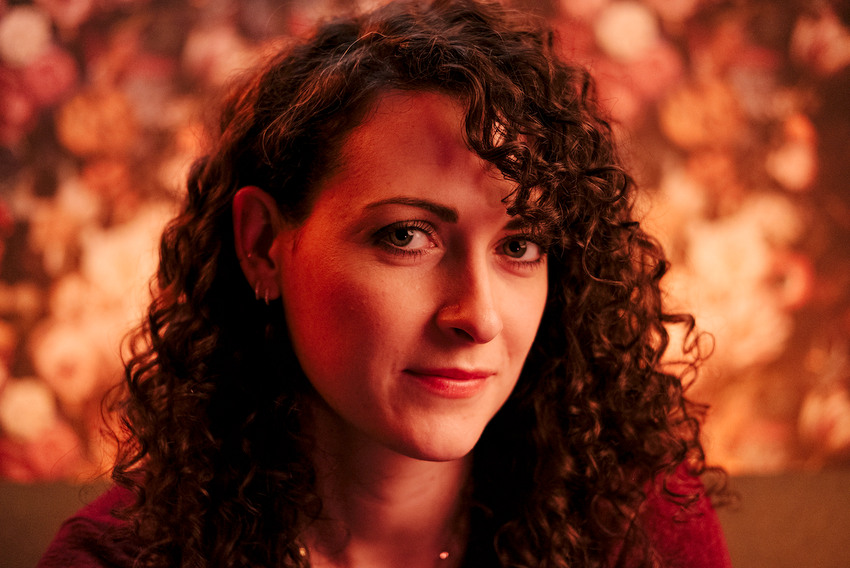
I’m Amanda Dyer and Tom (my husband). We are the co-directors of the film Unseen: How We’re Failing Parent Caregivers & Why It Matters. Our team of filmmakers are; Tom who also served as the cinematographer, and I produced the film. Unseen was edited by Erik Sharpnack with the original score by Andrew Piland.
indieactivity: Talk about your experience on story, screenplay, production, premiere, and marketing for UNSEEN?
Amanda Dyer (AD): Our film is about the challenges facing parent caregivers of children and adults with profound disabilities or complex medical needs. It’s not a story we have personally lived, so we worked very closely with parents to understand their stories in order to honestly portray them on screen.
The entire process was a learning experience – from understanding the issues to developing a distribution strategy. Tom has directed many documentaries, but this was our first independent project, so in addition to working through the creative and editorial process, we wanted to maximize the impact of the film as well.
How did you put the crew and cast together? Did you start writing with a known cast?
Amanda Dyer (AD): We happened across the family that was featured in the film via social media. We got to know them, and they were very generous in sharing their experience.

We had an extremely small crew, thanks to Tom’s experience as both a director and a DP. For post-production, we pulled in people we have worked with in the past and have good creative relationships with. Both our editor and composer shared our vision and made it a seamless process. My background in marketing and creative direction allowed us to hit the ground running when it came time for distribution.
We also joined the Show&Tell community for independent filmmakers, and they became like another team member, opening our eyes to the possibilities for distribution and impact. Having that community of other filmmakers through Show&Tell and experts was a game changer.
What and how long did it take to complete the script? (Was it a team effort or was it solo?)
Amanda Dyer (AD): The entire project took about three years from concept to premiere.
When did you form your production company – and what was the original motivation for its formation?
Amanda Dyer (AD): We both work in the creative field doing client work, but we wanted to collaborate on a documentary as a passion project. We came across this topic of parent caregivers, and I quickly realized that we had stumbled into an important issue that wasn’t getting much, if any, media attention.

It seemed clear that any positive change in this area would need to start with more awareness of the challenges facing this community. We started our production company, Quiet Life Creative, and began sharing about the project online. It started getting attention in the caregiver community and beyond, and we launched distribution with a very successful virtual premiere on the Show&Tell platform in May 2022.
During the film production, what scene (that made the cut) was the hardest to shoot? And why?
Amanda Dyer (AD): In the middle of production, the primary subject family moved to another state (from Tennessee to Michigan). This drastically limited our access, increased the costs of production due to travel and rentals, and extended the production timeline. When they moved, we still needed more footage of day-to-day family life that would round out the story. We planned a weekend trip to Michigan with this goal, knowing that it was our one opportunity to get what we needed.
Let’s talk about finance. How did you finance the film?
AD: We self-financed the initial development costs and ran a small crowd-funding campaign to cover production costs. We had many generous individuals and organizations who donated in order to bring this film to life. Now we are working with partners, including individuals, nonprofits and companies, to fund our outreach and impact campaign.
Unseen: How We’re Failing Parent Caregivers & Why It Matters | Official Documentary Trailer
How important is marketing? Do you think a project can make a dent without it nowadays? Tell us about marketing activities or efforts on this project – and how it worked or didn’t work?
AD: Marketing is extremely important for any film – it’s how people find out it exists! We didn’t want to just sit around and hope people found our film, so we’ve taken a very active approach to marketing.
As soon as our concept was crystalized, we started building an audience on social media. Our audience isn’t huge, but it’s full of people who are passionate about the project and the issues it explores, so they eagerly engage and share our content, which helps it grow even more.
We learned from Show&Tell that finding partners was critical for marketing success. We have identified numerous partners who have a similar mission, and want to use the film to support their goals as a company or organization. As our partners host screenings on the Show&Tell platform, it helps bring the film to new audiences and starts important conversations in communities around the world.
We have also created a variety of resources to accompany the film, including discussion guides, webinars, a resource directory and more, which have connected us to more audiences and partners. Show&Tell recently launched their acquisition and distribution service, which is completely different from a traditional distributor, as they will identify the target audience and design a custom distribution plan to profitably release their films, and filmmakers will make money side-by-side with Show&Tell from dollar one.
We’re excited that other filmmakers will have the chance to create opportunities for themselves, like we did, rather than rolling the dice with film festivals, streamers and traditional distributors.
What do you hope audiences will get from the presentation of your film?
AD: We hope people have their eyes opened to the difficult reality facing millions of parent caregivers in our neighborhoods, schools, workplaces and communities. It’s the first step to building more tangible support for caregiving families. And for caregivers themselves, we hope they feel seen and appreciated for the important work they are doing.
What else have you got in the works?
AD: Our website is the best place to keep up with the project and find out about upcoming screenings: caregiverdoc
Tom Dyer, Director & Cinematographer
Tom is a director and cinematographer based in Nashville, Tenn. He has extensive experience directing documentary films for global brands and nonprofits. With a passion for emotive storytelling, Tom brings a balance of technical expertise and artful choices to every project. Tom’s awards include numerous Gold and Silver Telly Awards for directing and cinematography.
Amanda Dyer Director & Producer
Amanda co-founded and serves as creative director of a digital marketing agency in Nashville, Tenn., and has led marketing and creative teams in a variety of corporate and nonprofit settings.
Tell us what you think of the interview with the Amanda Dyer. What do you think of it? What ideas did you get? Do you have any suggestions? Or did it help you? Let’s have your comments below and/or on Facebook or Twitter.
Follow Amanda Dyer on Social Media
Website
IMDb
LinkedIn
Instagram
MORE STORIES FOR YOU
Richard Green Documentary, ‘I Know Catherine, The Log Lady’: Premiere in NYC, LA May 9th
Lynchian Doc I Know Catherine, The Log Lady Makes Hollywood Premiere 4/17, Rollout to Follow
In Camera by Naqqash Khlalid Launch on VOD April 29
Naqqash Khlalid’s Directs Nabhan Rizwan. In Camera stars an EE BAFTA Rising Star Award Nominee.
2025 Philip K. Dick Sci-Fi Film Festival Award Winners Announced
Vanessa Ly’s Memories of the Future Awarded Best PKD Feature
Dreaming of You by Jack McCafferty Debuts VOD & DVD for April Release
Freestyle Acquires “Dreaming of You” for April 15th Release
Hello Stranger by Paul Raschid set for London Games Festival & BIFFF
The film Is set for an April 10th Premiere at The Genesis Cinema in London (LGF) and BIFFF
Daydreamers Official Trailer by Timothy Linh Bui: Released by Dark Star Pictures
Daydreamers Vietnamese Vampire Thriller – May 2nd release









